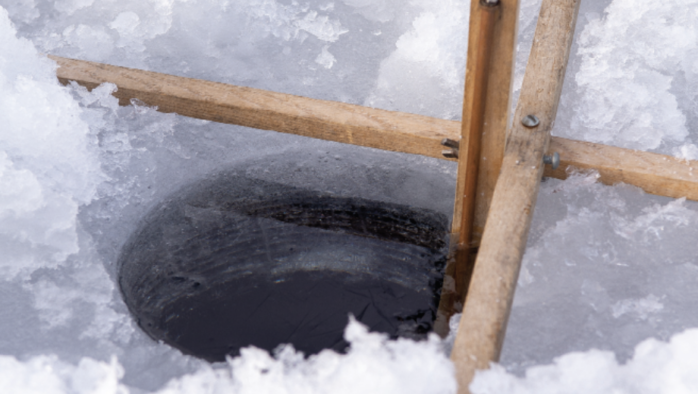
Courtesy VTF&W
Three to four inches of clear black ice in a drill hole below the top layer of snow, is the minimum for safe ice fishing.
Ice conditions across Vermont are inconsistent due to warm and variable weather, and the Vermont Fish & Wildlife Dept. is urging anglers to put safety first if they venture out ice fishing.
“Check the ice as you go, avoid areas where currents can create weaker ice, and if you are not sure the ice is safe find a different waterbody,” cautioned fisheries biologist Shawn Good. “With good judgment ice fishing is a safe and fun way to get outside in winter. But that means making cautious, smart decisions and changing plans if conditions are not what you hoped for.”
Ice conditions are currently variable across Vermont. At higher elevations and in the Northeast Kingdom many lakes and ponds have frozen over completely and have fishable ice. But in southern Vermont and the Champlain Valley, many lakes and ponds are not yet safe for ice fishing.
“Three to four inches of clear black ice is the minimum for safe ice fishing,” said Good. “For the kind of gray or opaque ice we get after repeated freezing, thawing, and re-freezing we recommend anglers look for at least six inches of ice where they plan to fish.”
Even on a single waterbody it is important to know that ice thickness is not always uniform. Areas around pressure cracks or near stream or river inlets can be thinner and weaker than surrounding ice.
The department says anglers should always carry a spud bar to test the ice as they go and should have a set of personal ice picks for self-rescue. Anglers should avoid fishing alone and should let someone know where they will be fishing and when they plan on returning home.
But despite poor or non-existent early season ice conditions in some areas of Vermont, eager anglers can still find safe ice fishing opportunities this month.
“While we wait for colder weather to freeze up waterbodies statewide, I recommend anglers focus on planning and getting their gear in top shape—or that they hit the road and explore the higher elevation waters or northern waters where there is already good ice,” said Good. “Fishing somewhere other than your home waters can be part of the adventure and allure of ice fishing, and is a great way to explore Vermont.”




